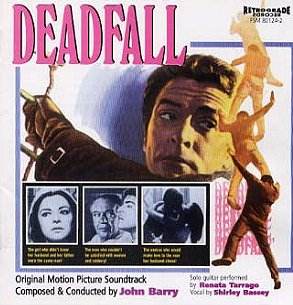John BARRY
Deadfall
 OST
OST
 Retrograde Records FSM
80124-2 * (39:52)
Retrograde Records FSM
80124-2 * (39:52)
Purchase from:
Crotchet
Amazon
UK

Deadfall occupies an interesting niche in John Barry’s long and impressive
resume. Composed at the height of his most creative period, the middle to
late 1960s, the score includes what must be the longest single setpiece
Barry’s ever written: a 14-minute cue composed especially as a concert
work. ‘Romance for Guitar and Orchestra’ is performed on
film before an audience while two thieves engineer an intricate break-in
and safe-robbing at the home of a couple attending the concert. The movie
cuts back and forth between the concert (Barry conducts his work on screen)
and the thieves at the home, with Barry’smusic doubling as the background
music for the break-in.
And, if director Bryan Forbes’ notes are to be believed, Barry wrote
his ‘Romance’ before filming started and with virtually no reference
to a script, leaving Forbes to shoot the scene and pray that, in the end,
the visuals and the music would fit. Frankly, that hardly seems likely, if
for no other reason than that it also seems so unnecessary. Why wouldn’t
Barry have had an outline of the scenario with at least a rough timing of
the break-in’s choreography, thus helping him to construct his music
with some sense of where dramatic highpoints were appropriate?
In any event, the result is unique in film music: an original work along
formal lines (Barry demurred from calling it a concerto, though he well could
have), heard in its entirety as background to an unrelated event. And as
a formal work, ‘Romance for Guitar and Orchestra’ stands up fairly
well. The instrumentalist, on screen as well as on the soundtrack, is Renata
Tarrago, who attractiveness no doubt made her a popular choice here. Barry
opens ‘Romance for Guitar and Orchestra’ with an andante movement,
displaying the gently ascending theme in various sections. (Is it my imagination,
or is a solo guitar especially suggestive of stealth? One can easily envision
the music working with the concurrent scenes of a thief scaling walls and
scrambling across rooftops.) The second movement, marked largo, also opens
quietly with strings but steadily grows more intense as the heist begins
to come apart. Orchestral climaxes occur at several points throughout the
"romance," corresponding to moments of daring or high frustration in the
heist scenes. Near the end, as the thieves chisel the safe out of the wall,
Barry returns to his main theme with full orchestra augmented by small
percussion, itself suggestive of the intricate tool work. The cue ends with
the thieves lugging the safe out of the house as Barry and Tarrago take their
bows in the concert hall. (I’m indebted to Jon Burlingame’s liner
notes which help track the music and screen action.)
How well any of this actually works on screen is difficult to say, as
Deadfall is virtually lost today. Reviews when the film premiered
in 1968 apparently were unkind, although one wonders how bad it could have
been. Forbes was a talented film writer-director and he surrounded himself
with decent talent, in this case actors Michael Caine and Eric Portman, producer
Paul Monash — and Barry, who scored six of Forbes’ films including
King Rat, The Wrong Box and The Whisperers. By itself, Barry’s
‘Romance’ is a significant piece of film music. Although coming
relatively early in Barry’s career, it displays a maturity that’s
largely lacking in his recent The Beyondness of Things.
The rest of the score to Deadfall is unrelated to ‘Romance for
Guitar and Orchestra.’ It consists primarily of a main theme introduced
in the main titles in the song ‘My Love Has Two Faces.’ It’s
serviceable and used seemingly to some effect in the cue ‘The Last
Deadfall.’
This 1999 Film Score Monthly CD, one of just three so far on its smaller
Retrograde Records label, includes two additional versions of the song. Neither
is nearly as satisfying as the main title version, sung by Shirley Bassey,
whose previous collaborations with Barry on Goldfinger and Diamonds
Are Forever were truly memorable. Lightning, alas, did not strike a third
time.
As with all of Film Score Monthly’s CD releases, this one has excellent
sound and informative liner notes which, in addition to Burlingame’s
contribution, also offer insights by producer (and FSM editor) Lukas Kendall
as well as director Forbes’ comments from the original LP soundtrack.
Reviewer
John Huether

![]()
![]()
![]()
![]()
![]()
![]()
![]()
![]()
![]()
![]()
![]()
![]()
![]()
![]()
![]()
![]()